- Home
- Nancy Buckingham
Call of Glengarron
Call of Glengarron Read online
CALL OF GLENGARRON
Nancy Buckingham
Chapter 1
Even the back of young Jamie’s head reproached me. He was kneeling on the floor, resentfully thrusting his toys into a canvas bag.
I felt frustrated tears pricking at the back of my eyes. How could you expect a child not yet five years old to understand the cruel realities of life? How could you explain that a father he couldn’t remember, a man to whom he owed nothing but his name, had the right to demand his return?
I said briskly, “Hurry up with your packing, darling. The taxi will be here in a few minutes.”
He swung around to look up at me, still clutching a grubby panda. His eyes were huge, sad and accusing.
“I don’t want to go to my daddy. I don’t like him....”
That called for a gentle reproof. “Jamie. How can you say that? You don’t know him.” Trying to keep the doubt from my voice, I added, “He’s a nice man, and you’re going to be very happy with him. Just you wait and see.”
“I don’t like my daddy,” Jamie repeated stubbornly. “Why can’t I go on living here with you, Lucy?”
Why not indeed? Nothing would have given me more joy than having the care of my poor dead cousin’s child—if only I were allowed to.
“It will be such fun for you,” I persisted. “Living in a great big castle in Scotland. You’ll love it.”
I stooped down and picked up a one-armed plastic spaceman, pushing it into the bag. “There, that’s it. Now we’re all ready.”
“I don’t want to go,” he said again, miserably. I could tell that tears were very near the surface with him, too, ready to spill out if I gave him half a chance.
My heart turned over in pity. He was such a very little boy to have to suffer an upheaval like this. It was barely more than a week since he had lost his mother, and now Jamie’s father was peremptorily demanding his return.
I felt a new burst of anger against Craig McKinross for his callousness. I could not forgive such an utter lack of sensitivity.
After all, it was Craig himself who had really been responsible for Margo’s death. Craig, who by his outrageous demands had made life impossible for his wife and driven her away from him.
These past few months I’d come to believe that she had succeeded in putting the unhappy past behind her. But I was wrong, too tragically wrong. If only I could have done more to help.
After the breakup of the marriage, Margo had returned to London and resumed her modeling career, fighting to carve a place for herself all over again in that fast-moving and highly competitive world. And this time she’d had a small son to consider, too. It hadn’t been easy for her.
Luckily, I was able to take Jamie off her hands quite often. He and I got along famously and sometimes, when Margo had a late evening engagement, Jamie would even spend the night with me. Then she would either collect him first thing next morning, or I’d take him home on my way to the office. Her smart Soho apartment wasn’t too far from the Regent Street headquarters of the public relations firm where I worked.
My cousin was always touchingly grateful. “Honestly, I don’t know how I’d manage without you, Lucy. You are an angel.”
“Don’t be silly. You know I always love having Jamie.”
“Poor little beggar. It’s just not fair.... A boy needs a father....” Margo cupped her chin with long expressive fingers and regarded me thoughtfully. “Make darned sure, Lucy, that you don’t ever get caught the way I did.”
“Well ...” I laughed awkwardly. “I hope I’ll be getting married one of these days.”
“As long as you avoid my ghastly mistake. For God’s sake don’t choose a man just because he’s a handsome brute.”
Craig McKinross had certainly been good-looking. I thought back to the day of their wedding six years ago. I remembered him holding me by the shoulders and lightly kissing my forehead. “What a very lovely bridesmaid you make, Lucy.” His quick smile, friendly and warm, had snatched my eighteen -year-old heart from its precarious moorings. Craig had instantly become my standard of male perfection— darkly handsome, tall and muscularly lithe. His marriage to my beautiful and wildly sophisticated cousin became my classic image of romance.
Their separation three years later had finally shattered my dreams. For such a blissfully promising start to end like that. It had seemed beyond understanding.
“The wretched man is utterly impossible.” Margo had exploded. “There’s absolutely no pleasing him.”
“Yet he seemed so nice.” I felt numbed, weakly helpless. “I thought you were going to be so happy together.”
“So did I. But I discovered that the creature’s nothing but a selfish boor. Every single thing has to be exactly the way he wants it.”
“What are you going to do now?” I’d asked her.
She shook her head sadly, biting back the tears. “I don’t know, Lucy. I just don’t know. But I’m darned if I’m going to let that man ruin my life—and Jamie’s too. I’ll just have to struggle along on my own as best I can.”
Bravely, Margo had set about starting afresh, making a new life for herself and her son. But she’d never been able to forgive Craig McKinross. She had never been able to forget his brutally selfish behavior.
In a way, poor little Jamie, though she loved him dearly, was a perpetual reminder of her husband. The boy was so like his father. That same wiry black hair, the wide mouth and eyes that were a dark smoke blue....
And now the veneer of gaiety Margo had pasted over her unhappiness was savagely exposed as a sham. While Jamie was away staying the night with me, Margo had turned the gas heater full on, unlit. And in the morning, when neighbors found her, it was too late.
There could be no doubt that it was suicide. Any chance of accidental death was ruled out by the police owing to the care with which her sitting room had been sealed before the gas was turned on. Even the whisky she had been drinking, didn’t that help prove suicide? Margo had never possessed a lot of physical courage. I don’t think she could have carried through such a plan without the help of alcohol.
But the polite official evasions, made me angry. Was it fair of the police to hint at insanity? Could a woman driven to despair by an unfeeling man reasonably be described as mad?
Quite aside from my grief, Margo’s death had been a great shock to me. The possibility that she would ever take such a final, desperate step had not so much as entered my mind. I hadn’t believed that her life was so utterly devoid of hope. Not to this extent—that she would deliberately put an end to it.
For a brief, abyss-opening second, another possibility jumped into my mind. But I thrust it away instantly. Margo had no enemies. Of course in her sort of career there were professional jealousies, rivalries among the cliques. That was inevitable. But this was something different. No—she couldn’t have had any real enemies.
Little Jamie was still kneeling on the floor, hugging his bag of toys as if they were his one contact with reality. Usually he chattered endlessly, but now he was silent, brooding. I searched in my mind for some way of cheering him up.
“There’ll be so many new things for you to do up in Glengarron,” I said. “Perhaps you’ll be able to go on the loch in a boat. You’d like that, wouldn’t you?”
He looked up at me wistfully, still holding tight to his bag.
“I’d much rather stay here and live with you,” he said in a small voice. “Why can’t I, Lucy?”
“Oh, darling, I wish you could. But ... but I’ve only got this little flat, and ... well—I have to go out to work every day....”
“But I’d be a good boy, Lucy—really I would.” He paused, then added anxiously, “And I wouldn’t eat very much.”
I swung away q
uickly, pretending to search in my handbag. It needed a terrible effort to keep my voice steady.
“You see, Jamie, now Mummy isn’t here any more ... well, it’s only right you should go to your daddy. He loves you and wants you with him....”
Abruptly, cutting through my platitudes, Jamie asked: “Why did Mummy hate my daddy?”
“Of course Mummy didn’t hate your daddy,” I lied quickly. “Of course she didn’t.” If only Margo hadn’t spoken so freely about her bitterness toward Craig. A small child could absorb so much of the conversation going on over his head.
Jamie’s logic was impeccable. “If Mummy didn’t hate my daddy, then why didn’t we live all together like other families?”
“They had a sort of quarrel, you see,” I said carefully. “Just like you and your little friends have sometimes. Only with grown-ups the quarrels last a bit longer, and it’s best for two people not to live together until they feel friendly again.”
He shook his head firmly. “Mummy wouldn’t have made it up.”
“Oh, I expect she would have in a little while. It was just that ... that she was cross with your daddy. But she loved him really....”
“Do you love my daddy, Lucy?”
“No, of course not.” My reaction was immediate, unthinking. For me “love” had all the connotations of adulthood. Too late it hit me that Jamie was using the word with the simple innocence of a child.
“I don’t love my daddy either,” he said with grim satisfaction. “I think he’s a nasty man.”
“But I didn’t mean ...” I floundered helplessly. What could I say? If I contradicted my words, if I stated that I did after all love Craig McKinross, I ran the risk of being quoted by Jamie when we reached his father’s home in Scotland. And how would I ever explain that away? “Your daddy is a very nice man,” I finished lamely, asking heaven to forgive me.
I glanced at my watch. Five past eight. Another ten minutes before the taxi was due. I did a quick tour of the flat, making sure everything was properly turned off.
It made me feel like a traitor to be handing Jamie over to his father. I was about to deliver the little boy to a gaunt Scottish castle in the remote highlands of Wester Ross. To give him into the care of Craig’s aunt and her husband—a couple Margo had once graphically described as dried-up desiccated old sticks. What sort of background was that for a child accustomed to love and warmth?
But there was nothing, absolutely nothing, I could do to prevent Jamie going there. Even if I hadn’t been a single girl with a living to earn, I still couldn’t have kept him. I had no claim. The fact that I knew the little boy better than any other living person meant nothing beside the legal rights of his father. The man who had treated his wife so abominably, who until now had shown no interest at all in his son, could demand the instant return of his child.
As if it wasn’t bad enough to have just lost his mother, Jamie was being wrenched away from everything else that gave his life some shape, some meaning. The nursery school, his little playmates—and me. He was to be dragged away at the merest whim of a man who couldn’t possibly feel any love for him.
The one person who might have staked some sort of counter-claim—Margo’s father—was unwilling to put himself out. “Of course the child must go to the surviving parent,” he had told me curtly. “It’s only right and proper.”
“But, Uncle Arthur, he doesn’t even know his father’s people. He’ll feel so lost and unhappy. Isn’t there some other way?”
“He’ll soon adjust to his new life. Children do. Lots of boys at my school are homesick at the beginning of the term. You catch them grizzling in the dormitories sometimes. But they get over it in a day or two.”
It was no good trying to argue with Uncle Arthur. Teaching at a private boarding school, he considered he knew all there was to be known about boys. Yet for a long time I’d had a sneaking suspicion that he didn’t really like children. His interest in them was academic. He was concerned only with how much history he could pump into them to pass their examinations. Children were, so to speak, empty vessels to be filled, corked and dispatched. His not quite five-year-old grandson meant little to him. Jamie was a problem to be sorted out—and like all problems, the sooner a neat solution was found, the better.
Uncle Arthur was a man with curiously little emotion. When my aunt died years ago, he had disposed of their home and taken a residential post at St. Meredith’s just outside London. It had seemed to suit him very well. He continued to see Margo fairly regularly, and I believe he quite enjoyed her company. Perhaps in his own oddly withdrawn way he took pride in possessing such a beautiful daughter, especially when she began to achieve some success as a model.
But I also believe that he was quite unmoved by the news of Margo’s death, treating it rather as a tiresome interruption to his orderly existence. He had attended to all the details of the funeral as though he wanted the whole business over and done with as quickly as possible. His daughter’s child he had been very glad to leave in my care. And when he heard that Jamie’s father wanted to have the boy back, Uncle Arthur grunted with satisfaction that the last remaining headache was solved. Already, though Jamie was still in London with me, Uncle Arthur had returned to his school and immersed himself in routine again, the ripples caused by Margo’s death fading back to smooth tranquility.
He had left to me the tricky job of explaining things to the poor little boy.
If I’d thought there was the slightest chance of keeping him, I’d have made a fight of it. But I knew I hadn’t a hope. To resist the father’s demands, and then inevitably lose, would do Jamie absolutely no good at all. It was better to make the break now, putting the brightest complexion on it that I could manage.
At least I had a few days left. Enough, perhaps, to wean Jamie away from such dependence on me and help him accept his new environment.
Craig’s aunt, Isabel Lennox, had written me from Glengarron Castle. Craig, it seemed, wanted his son there when he arrived home, which would be just as soon as he could wind up his work with the U.N. experimental forestry unit in the Middle East. I was asked to take Jamie up to Scotland. Mrs. Lennox suggested that it might be a good idea if I stayed over for a couple of days to help him settle in.
The letter was rather vague and abstracted. She barely referred to Margo, and betrayed no grief over her death. Condescendingly—though usefully—she enclosed a check to cover traveling expenses from London to Inverness. At least it looked as if Craig’s aunt was aware that I was a working girl.
I rang the office and outlined the position to my boss. Already I’d been off work for over a week while I coped with Jamie, and I asked if he’d let me count this time against my vacation.
Mr. Bentley brushed my suggestion aside briskly. “Forget it, Lucy. You take whatever time off you need, and we’ll call it compassionate leave. That poor little kid’s had a rough deal in life.”
I was surprised that he seemed to know so much about Jamie, until I rumbled that Mike Rogers must have filled in the details. As a free-lance photographer, Mike had run across Margo from time to time, and he was currently doing quite a bit of work for my own firm. Just lately we’d been going around together. Mike had developed rather a thing about me, and though I wasn’t able to feel quite the same for him, he doggedly kept on trying.
When the phone rang a few minutes before Jamie and I were due to leave, I wasn’t a bit surprised to find Mike on the line.
“Thought I’d rouse myself at the crack of dawn just to wish you bon voyage....” He yawned. “Or is that right for a plane trip?”
I smiled into the phone. “It sounds okay to me.”
“How’s the kid bearing up?” The underlying laughter that was almost a permanent feature of Mike’s voice was missing now. “You poor darling —is it awfully grim for you?”
I glanced quickly at Jamie. He still sat on the floor, aimlessly zipping and unzipping the bag. He didn’t appear to be taking any notice of me, but I was wary.
> I made myself sound cheerful. “We’re looking forward to the flight, aren’t we, Jamie?”
He craned his neck to look up at me. “Will it be a jet, Lucy?”
“Did you hear that? Jamie wants to know if our plane will be a jet.”
With masculine scorn at my ignorance, Mike launched into a string of incomprehensible technicalities.
I grinned at Jamie. “He says it will probably be a jet.”
I was just going to say goodbye and hang up when Mike cut in, “Oh, by the way, I forgot to tell you. I ran into Joe Ellison—you know, the picture man on Glamour—and he said he saw Margo the night she died.”
“Really? Did he say where?”
“Yup. Having dinner with some bloke at the Albatross.”
I wasn’t very knowledgeable when it came to the smarter restaurants. They were way out beyond my sphere.
“You know—in Mayfair. Very posh.”
“I wonder why it didn’t come out when the police were asking questions?’’ I had to be so terribly careful what I said, with Jamie within hearing. “I mean ... well, nobody came forward, did they?”
Mike laughed—a grating, worldly-wise sneer that he liked to put on sometimes. “You’re altogether too innocent for this big city, darling. What would the chap’s wife have said, if she discovered what hubby was really up to that time he was supposed to be kept late at the office with a client?”
“I don’t know why you’re always getting in nasty digs about Mar—about her. She wasn’t a bit the sort you make out.”
Mike laughed again, but it was a much gentler sound this time. “I suppose I’d better let you hang onto a few illusions.”
It was grossly unfair to poor Margo. Just because she was a model, everyone automatically assumed her to have been free and easy with men. Of course she appeared to be terribly glamorous, and in her job she’d had to mix with a lot of men. But beneath the facade of sophistication I reckoned I’d known my cousin better than anyone else.
We had always been close, in spite of the five years between us. We’d been drawn together more than most cousins because we had both of us lost our mothers while we were still children. They had been twins, her mother and mine—though as different as chalk from cheese. They had died from quite separate causes within six months of one another. Margo was sixteen at the time, and I was only eleven and from then on we’d seen a good deal of one another. When Margo’s father sold his home to take the post at St. Meredith’s, she came to live at our house. This happy arrangement lasted until her early success as a model enabled Margo to take her own apartment.

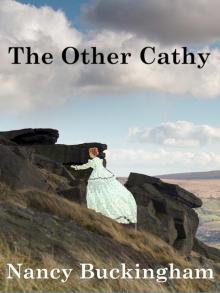 The Other Cathy
The Other Cathy Design for Murder
Design for Murder Valley of the Ravens
Valley of the Ravens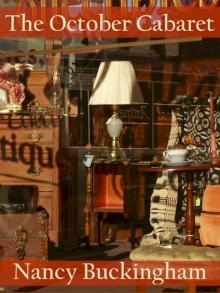 The October Cabaret
The October Cabaret Model Murder
Model Murder Murder in the Cotswolds
Murder in the Cotswolds Deadly Deceit
Deadly Deceit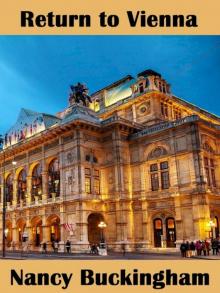 Return to Vienna
Return to Vienna Shroud of Silence
Shroud of Silence The Silver Castle
The Silver Castle A Cotswolds Legacy
A Cotswolds Legacy Marianna
Marianna Cold Coffin
Cold Coffin Kiss of Hot Sun
Kiss of Hot Sun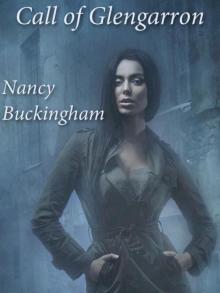 Call of Glengarron
Call of Glengarron Quest for Alexis
Quest for Alexis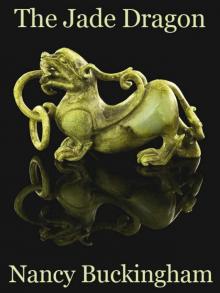 The Jade Dragon
The Jade Dragon